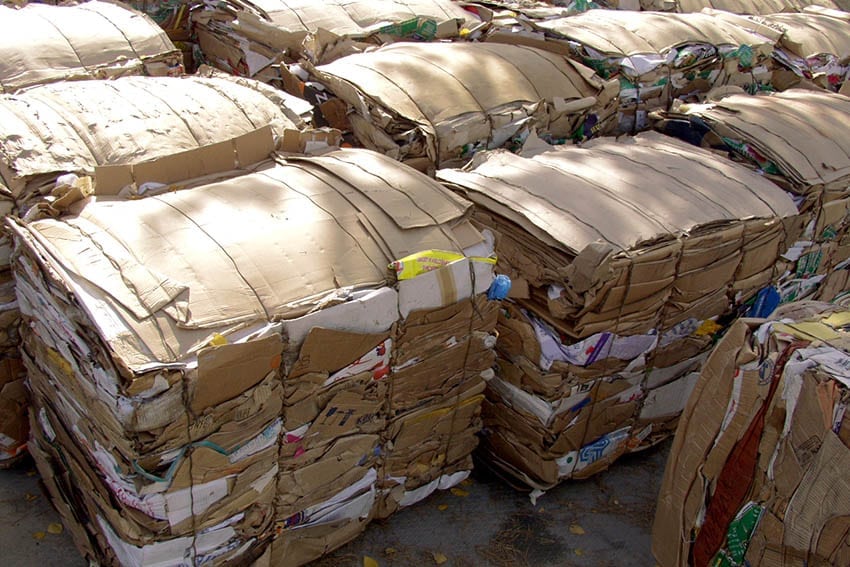
During recent earnings calls, a number of fiber company executives touched on pricing trends they are seeing around OCC and other grades.
One major U.S. mill operator is actively shipping recycled paper pulp to China, and another is installing equipment to bring in lower grades of paper feedstock. Those were a few takeaways from recent earnings calls from publicly traded paper firms.
The companies in recent weeks reported earnings results either for the first quarter of 2020 or the last quarter of 2019.
In investor calls, executives with Sonoco Products, Graphic Packaging, Packaging Corporation of America and Cascades touched on pricing trends they are seeing around OCC and other grades, and they offered updates on their strategies to take advantage of current market realities.
Additionally, equipment manufacturer Kadant said it is seeing ongoing growth in paper processing in Southeast Asia.
Shifting strategy to send pulp to China
Sonoco Products CEO Robert Coker said the company has been working since December to phase out about 50,000 tons of uncoated recycled board production in its Canadian mills. The company has replaced that volume with recycled pulp production, he noted, and the output pulp “has been shipped to China to meet their need for cost-effective, high-quality recycled fiber.”
Exporting recycled pulp has emerged as a way to move recovered fiber feedstock into China by circumventing the country’s import restrictions on raw recovered paper. Some experts have noted it makes more economic sense to establish pulping mills in Southeast Asia, much closer to the material’s final destination. But Sonoco’s move indicates the export of pulp from North America to China is penciling out.
Other mills that have hinted about plans to export pulp include Phoenix Paper in Wickliffe, Ky. and Nine Dragons’ U.S. operations in Maine and Wisconsin. Recently, the Chinese government removed a tariff on pulp material.
Sonoco has made a number of investments in response to the market turbulence of the past couple years, including adding capacity to bring in more mixed paper.
Coker, the company’s CEO, also commented on the growing list of countries enacting paper import restrictions, most recently India and Indonesia. These policy changes, he said, are playing into current OCC pricing trends.
Capability for lower-quality feedstock
Graphic Packaging, meanwhile, indicated it is installing a recycled paperboard system at its Kalamazoo, Mich. paper mill, as was previously announced last summer. That project is underway and is slated for an early 2022 start-up.
The company’s Michigan expansion is capacity-neutral, suggesting Graphic will not be taking in more recovered fiber than it already does. But the technology the company is using is notable because it will allow Graphic to take in lower-quality feedstock, which could mean the company brings in additional mixed paper.
“We’re going to have the most modern, state-of-the-art cleaning systems there,” CEO Michael Doss said. “So we’ll be able to take an increasingly lower-quality grade of material and turn that into high-quality paperboard.”
New line on schedule at Washington plant
Packaging Corporation of America is currently adding fiber recycling capacity at its mill in Wallula, Wash. Last fall, company officials announced a 350,000-ton-per-year recycled fiber pulp line would be starting up sometime in 2020, and in the recent call they noted the project is moving ahead.
“We expect to have the OCC plant up and running by the end of the year at Wallula, so that’s well on schedule,” said Mark Kowlzan, the company’s CEO.
Kowlzan added that Packaging Corporation of America looks at the Wallula conversion in part as a cost-saving measure. The mill has the highest fiber input costs in the country, he added, and being able to bring in OCC “will give us truly some great opportunities to optimize the fiber cost at that location.”
Dissecting fluctuations in OCC prices
At Cascades, company officials anticipate relatively low OCC prices will remain for the near future. The company reported the average OCC index price seen in the fourth quarter of 2019 was down 56% compared with the fourth quarter in 2018, and down 9% from the third quarter in 2019.
“We expect OCC market to remain favorable for buyers in the coming months due to the excess of material in North America,” said Mario Plourde, CEO of Cascades.
He noted the last few weeks have brought a tighter market for OCC, but he attributed this to normal shifts, noting that “we are in the lower generation season.”
“We expect that, with the generation of fibers that will start to increase again by the end of March, that we will get back to a favorable market for OCC for buyers,” Plourde said.
Continuation of SE Asia trends
Kadant, which sells paper recycling equipment to mills worldwide, has reported previously growth in Southeast Asian mills shipping fiber into China. The company recently noted this activity continues to increase.
Company CEO Jeffrey Powell said the industry is “slowly starting to see the fiber go into other areas outside of China and be processed and then shipped into China.”
He noted China’s import restrictions are “forcing the fiber and production capability to come up in other parts of the world, and that’s kind of the period we’re in right now.”
In the U.S., he anticipates recovered fiber will be worth more in the future, after the current market strife sorts itself out. Powell pointed out that prices for clean OCC coming out of warehouses or packing plants, rather than the MRF setting, are seeing increases due to the demand for the material.
Powell predicts the increasingly stressed relationship between hauler/processors and municipalities will ultimately settle itself as well. Contracts between these two points in the value chain of late have largely moved toward a fee-for-service model rather than a revenue share system.
“I would say we’re in the middle of that getting sorted out,” Powell said. “It will eventually find some equilibrium point where the economics work for both the communities and the collectors, but we’re not quite there yet.”
More stories about fiber
- Fiber end users talk price increases, demand outlook
- Pizza box demand declining, report says
- Nebraska city to accept paper cups in curbside bins



